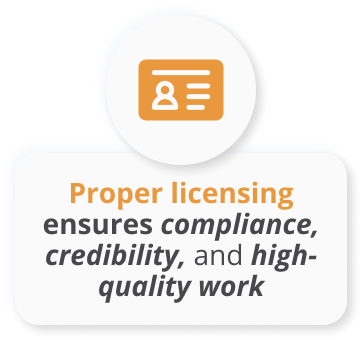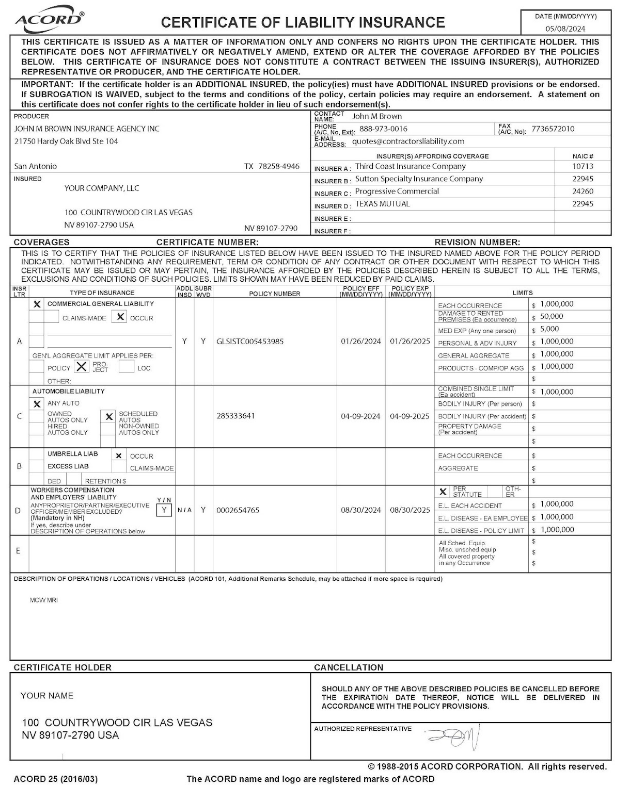Introduction: The Importance of Specialty Licenses
In Nevada, skilled trades such as electrical, plumbing, and heating, ventilation, and air conditioning (HVAC) are critical to the construction industry and require specific licenses. These trades require high levels of expertise and come with significant safety responsibilities, so the Nevada State Contractors Board (NSCB) requires specialized licenses for professionals in these fields. Licensed contractors are essential to comply with state laws and to ensure safety and quality of work. Obtaining the proper specialty license is essential not only to comply with state laws, but also to establish your credibility and ensure the safety and quality of your work.

Licensing Requirements
The NSCB oversees the licensing process Licensing for Specialty Contractors in Nevada. Each specialty has its own set of requirements designed to ensure that contractors possess the necessary skills and knowledge. There are several types of contractor licenses available in Nevada, each crucial to ensuring that contractors meet state standards for safety and competency.
- Electricians:To work as an electrician in Nevada, you must obtain a license through the NSCB. This involves demonstrating substantial work experience, usually gained through an apprenticeship or as a journeyman, and passing a state-administered exam covering the National Electrical Code and Nevada-specific regulations.
- Plumbers: Plumbers must be licensed by the NSCB. This process includes completing an apprenticeship or equivalent on-the-job training, followed by passing a state exam focusing on plumbing systems and compliance with Nevada plumbing codes.
- HVAC Contractors: HVAC contractors, who work with heating, ventilation, and air conditioning systems, must also obtain a license. The licensing process involves demonstrating relevant experience and passing an exam that covers HVAC systems, installation practices, and state-specific requirements.
Specialized Courses for HVAC Subcategories
- Refrigeration: A course focused on refrigeration systems, covering everything from basic refrigeration cycles to advanced system troubleshooting.
- Sheet Metal: Training in sheet metal work for HVAC, including duct fabrication and installation.
- Solar Air Conditioning: Covers the integration of solar technology with traditional air conditioning systems, including installation and maintenance.
- Solar Air Conditioning Systems: Covers the integration of solar technology with traditional air conditioning systems, including installation and maintenance.
- Hot Water Piping: This course covers the installation and maintenance of piping systems specifically for hot water in HVAC systems.
Each of these specialties, along with others such as refrigeration, fire protection, and sheet metal work, has specific requirements tailored to the complexities and risks associated with the trade.
Exam and Score Details
To qualify for a Nevada specialty contractor license, Applicants must meet specific experience and meet the following criteria: exam:

Experience
Most specialty licenses require several years of documented work experience in the relevant trade. This experience is often obtained through formal apprenticeships, on-the-job training, or working with a licensed contractor.

Educational Certificates
Depending on the trade, additional educational degrees may be required. For example, HVAC contractors may need to take courses on energy efficiency and environmental regulations.

Exams
After meeting the experience and education requirements, applicants must pass a trade-specific examination administered by the NSCB. The exams are designed to assess the applicant’s technical knowledge, safety procedures, and familiarity with Nevada regulations. Additionally, the law and business exam is a crucial part of the examination criteria for obtaining a specialty contractor license in Nevada. Continuing education is often required to renew the license and stay up to date with industry standards.
Local Variations
While the NSCB provides a standardized framework for specialty licensing in Nevada, some cities and counties may have additional requirements:
- Las Vegas: As the largest city in Nevada, Las Vegas may impose stricter local regulations, especially for large-scale commercial projects. Specialty contractors may need to obtain additional permits or pass specific inspections tailored to city building codes.
- Reno: In Reno, contractors may face additional requirements related to energy efficiency and environmental compliance, particularly in response to local sustainability initiatives.
Nevada contractors should always check with local building departments to ensure they meet all necessary requirements, which may include additional certifications, permits, or compliance with local codes.
Insurance Must Have To Get Your Contractor License In Nevada
To get a contractor license in Nevada, you must meet specific insurance requirements that are crucial to protecting both your business and your clients. Here’s an overview of key insurance requirements.

General Liability Insurance
- Requirement: All Nevada contractors must carry general liability insurance as a requirement for obtaining a contractor’s license in Nevada. This insurance provides coverage against claims for property damage, bodily injury, or personal injury that may occur.
- Coverage Amounts: The minimum coverage required varies depending on the contractor’s license type and the scope of work. Coverage typically ranges from $100,000 to $1 million per incident, but larger projects may require higher coverage limits.

Workers’ Compensation Insurance
- Requirement: If you have employees, Nevada law requires you to have workers’ compensation insurance as a requirement for obtaining a Nevada contractor’s license. This insurance covers expenses.
- Exemptions: Sole proprietors with no employees are generally exempt from this requirement, but it is important to confirm your specific situation with the Nevada State Contractors Board.

Surety Bond
The bond amount is determined by the NSCB at the time of license approval. The surety bond can range from $1,000 to $500,000 depending on several factors:
- Type of license: Different license classifications may require different surety bond amounts.
- Financial responsibility: The past, present, or anticipated financial stability of the applicant.
- Monetary limit: The surety bond amount may be influenced by the financial scope of operations.
- Experience and character: The professional history and reputation of the contractor.
Surety bonds are a requirement for obtaining a general contractor license in Nevada. Once your license application is approved, the NSCB will notify you of the required surety bond amount before issuing the license. You can meet this requirement by obtaining a surety bond or by making a cash deposit in the specified amount.
Additional Insurance Considerations
Commercial Auto Insurance: If you use vehicles as part of your contracting business, you may also need commercial auto insurance to cover any accidents or damages involving your vehicles.
Professional Liability Insurance: Also known as Errors and Omissions (E&O) insurance, this coverage is recommended for contractors who provide design or consulting services. It protects against claims for negligence or errors in your professional services. Understanding all aspects of contractor management, including insurance, is critical, and the Contractor Management Survey is an essential exam that covers these topics comprehensively.

Key Takeaways for Specialty Contractors
- Understand the licensing requirements specific to your trade.
- Gain the necessary experience and pass the required exams. To assist with this, consider enrolling in an online exam preparation course designed to help contractors prepare for licensing exams.
- Stay informed about local variations in licensing and regulations.
- Maintain your license through continuing education and compliance with state and local laws.
To ensure that you fully understand and comply with Nevada contractor licensing requirements, including bonding obligations and other essential regulations, it is important to familiarize yourself with the specific rules and statutes that govern contractors. contractors in the state. You can access detailed information and official guidelines directly from the Nevada State Contractors Board by visiting their Rules, Regulations, and Statutes
This resource provides comprehensive information on the legal framework governing contractor licensing, ensuring that you are well-informed on the obligations and standards required to maintain your license in Nevada.
Make sure you stay ahead of the curve in Nevada’s construction industry. Get the information you need to avoid mistakes and ensure your projects meet the highest standards. Check out the 2020 Blue Book from the Nevada State Contractors Board and gain the knowledge you need to succeed.
Frequently Asked Questions (FAQ)
Here are common questions about general contractor licensing in Nevada.
Nevada offers several contractor licenses, including general contractor, specialty contractor, electrical contractor, plumbing contractor, and HVAC contractor. Each type of license has specific requirements and regulations.
The type of license you need depends on the specific trade you plan to work in. For example, if you work with electrical systems, you’ll need an electrical contractor license. Please review the specific job duties and consult with the Nevada State Contractors Board (NSCB) to determine the correct license classification.
You must meet the experience and education requirements, pass the required exams, provide proof of financial responsibility (such as a surety bond), and submit a completed application to the Nevada State Contractors Board.
Required experience varies by license type. Typically, contractors need at least four years of work experience at the journeyman level or higher within the past 10 years. This experience must be verifiable and relevant to the trade you are applying for.
Yes, most contractor licenses in Nevada require passing a state-administered exam that covers trade-specific knowledge, Nevada laws and regulations, and business administration.

